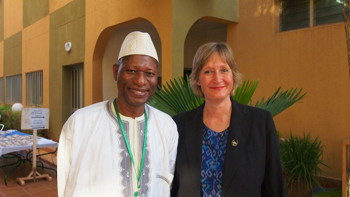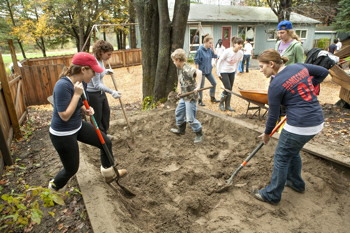COVER STORY
Action Teens, apples and the spirit of democracy: Cornell's culture of public engagement expands the definition of 'land grant'
Page 2 of 9
Cornell is New York state's land-grant university. The U.S. Morrill Land Grant Act of 1862 provided a grant of federal land to each state to provide for "at least one college in each state where the leading object shall be, without excluding other scientific or classical studies, to teach such branches of learning as are related to agriculture and the mechanic arts [engineering] ... in order to promote the liberal and practical education of the industrial classes." The Act, which also allowed the sale of the donated land to fund a state's land-grant university, specified that military tactics be taught at land-grant colleges and recognized that other branches of science and knowledge should be embraced – effectively extending the land-grant mission to all colleges and departments at Cornell.

Cornell helped organize the first West Africa Conference on the System of Rice Intensification (SRI), which was held in Ouagadougou, Burkina Faso, in July 2012. Pictured are workshop leaders Gaossou Traore, coordinator of the National Center of Specialization of Rice in Mali, and Erika Styger, director of programs of the SRI International Network and Resources Center at Cornell. See larger image
From their very founding, the land-grant institutions served the public good, then, by educating citizens in practical subjects and by creating new knowledge in fields that were important to their state's economies.
Skorton attributes one of Cornell's most enduring qualities to its land-grant mission: "the commitment to developing knowledge that benefits communities."
This commitment to fulfilling the land-grant mission through public engagement is a distinctive feature of a Cornell education and one that is emphasized in the university's strategic plan. It "depends on the interest and enthusiasm of faculty, staff and especially students to be successful," Skorton says. It is they who "help connect outreach and public engagement so effectively to teaching, learning and research."

Students participate in the Cornell Public Service Center's annual Into the Streets volunteer event to aid communities in Ithaca and the surrounding area. Photo: Kai Keane. See larger image
Ronald Seeber, senior vice provost and a professor in the ILR School, says that public engagement is "in the very culture of Cornell's faculty, even among professors who might not have any public engagement duties built into their job descriptions – from the biology professors who are helping New York state high school classes conduct experiments using supplies and equipment that teachers don't ordinarily have access to, to the English professor who goes out and volunteers in the local prisons; this is just part of Cornell's identity."
Here are just a few stories that show Cornell's spirit of public engagement at work today – in places as familiar as a 4-H after-school program in New York and as surprising as an online repository of U.S. law.
<<View entire story as one page>>
